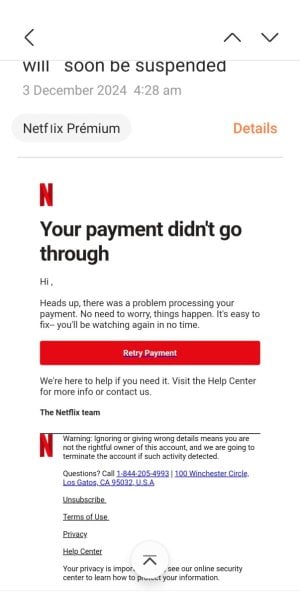New phishing scam steals personal details and financial data across 23 countries
By
Gian T
- Replies 6
As we embrace the digital age with open arms, enjoying the convenience of streaming services like Netflix.
It's crucial to stay vigilant against the dark side of the internet: scams and phishing attacks.
Recently, a massive Netflix scam has been making headlines, targeting users in 23 countries, including Australia.
The scam, as reported by cybersecurity firm Bitdefender, involves a sophisticated SMS phishing campaign designed to steal Netflix login credentials and personal and credit card information.
Potential victims receive a text message claiming that their Netflix subscription payment has failed and their account is on the brink of suspension.
The message includes a link urging the recipient to authenticate their account and update their credit card details to avoid service interruption.
But here's the catch: the link doesn't lead to Netflix. Instead, it directs the unsuspecting user to a fraudulent website where their sensitive information is harvested and sold on the dark web.
This puts individuals at risk of financial loss and exposes them to potential identity theft and future cyberattacks.
This SMS phishing campaign has spread its tentacles worldwide, affecting users in countries such as the United States, Germany, Spain, Australia, Greece, and Portugal.
The link may look official at first glance, using Netflix's branding to appear legitimate, but it's a wolf in sheep's clothing.
So, how can you protect yourself from such SMS phishing scams? First and foremost, be aware that Netflix and most other companies do not contact customers via text messages to request personal or financial information.
While Netflix doesn't offer two-factor authentication, you can still take several steps to safeguard your digital life.
Ensure your devices have robust security solutions, such as top-tier antivirus software or reputable Android apps.
These tools can provide a strong defence against malware and other malicious threats.
Moreover, exercise caution when sending links from unknown or unexpected senders.
If you need clarification on the authenticity of a message, do not click on any links.
Instead, manually type the website's address into your browser's search bar to check your account status directly on the official site.
Should you accidentally visit a dubious website, change your passwords immediately and consider cancelling your credit card if you've made any transactions.
Scammers often impersonate well-known brands like Apple, Microsoft, and now Netflix, especially during peak shopping seasons like the holidays.
To avoid falling prey to these scams, it's essential to scrutinise every email, text, and social media message you receive.
By keeping a sharp eye and refraining from clicking on suspicious links, you can protect your Netflix account and your personal and financial well-being.

How can you tell if a Netflix message is real or a scam? What should you do if you click a suspicious link and risk compromising your account or credit card? Let us know in the comments below.
It's crucial to stay vigilant against the dark side of the internet: scams and phishing attacks.
Recently, a massive Netflix scam has been making headlines, targeting users in 23 countries, including Australia.
The scam, as reported by cybersecurity firm Bitdefender, involves a sophisticated SMS phishing campaign designed to steal Netflix login credentials and personal and credit card information.
Potential victims receive a text message claiming that their Netflix subscription payment has failed and their account is on the brink of suspension.
The message includes a link urging the recipient to authenticate their account and update their credit card details to avoid service interruption.
But here's the catch: the link doesn't lead to Netflix. Instead, it directs the unsuspecting user to a fraudulent website where their sensitive information is harvested and sold on the dark web.
This puts individuals at risk of financial loss and exposes them to potential identity theft and future cyberattacks.
This SMS phishing campaign has spread its tentacles worldwide, affecting users in countries such as the United States, Germany, Spain, Australia, Greece, and Portugal.
The link may look official at first glance, using Netflix's branding to appear legitimate, but it's a wolf in sheep's clothing.
So, how can you protect yourself from such SMS phishing scams? First and foremost, be aware that Netflix and most other companies do not contact customers via text messages to request personal or financial information.
While Netflix doesn't offer two-factor authentication, you can still take several steps to safeguard your digital life.
Ensure your devices have robust security solutions, such as top-tier antivirus software or reputable Android apps.
These tools can provide a strong defence against malware and other malicious threats.
Moreover, exercise caution when sending links from unknown or unexpected senders.
If you need clarification on the authenticity of a message, do not click on any links.
Instead, manually type the website's address into your browser's search bar to check your account status directly on the official site.
Should you accidentally visit a dubious website, change your passwords immediately and consider cancelling your credit card if you've made any transactions.
Scammers often impersonate well-known brands like Apple, Microsoft, and now Netflix, especially during peak shopping seasons like the holidays.
To avoid falling prey to these scams, it's essential to scrutinise every email, text, and social media message you receive.
By keeping a sharp eye and refraining from clicking on suspicious links, you can protect your Netflix account and your personal and financial well-being.
Key Takeaways
- There has been an SMS phishing campaign targeting Netflix users in 23 countries, aiming to steal their account and credit card information.
- The scam tricks customers with a false alert about their subscription payment and impending account suspension, providing a fraudulent link for them to update their details.
- To protect against such SMS phishing scams, individuals are advised to use robust security solutions and avoid clicking links from unknown or unexpected senders.
- Netflix does not contact customers via text messages, and users are urged to verify any suspicious communication by manually entering the Netflix website in their browsers.









